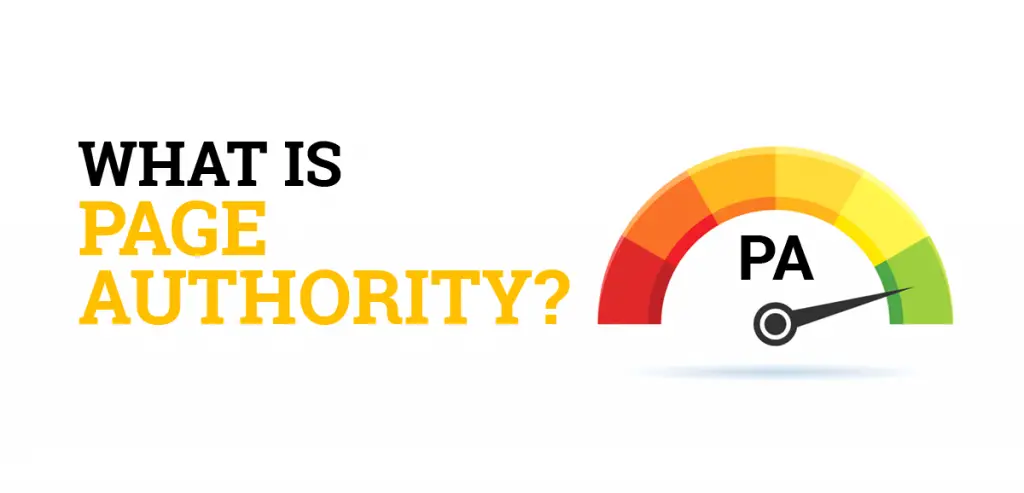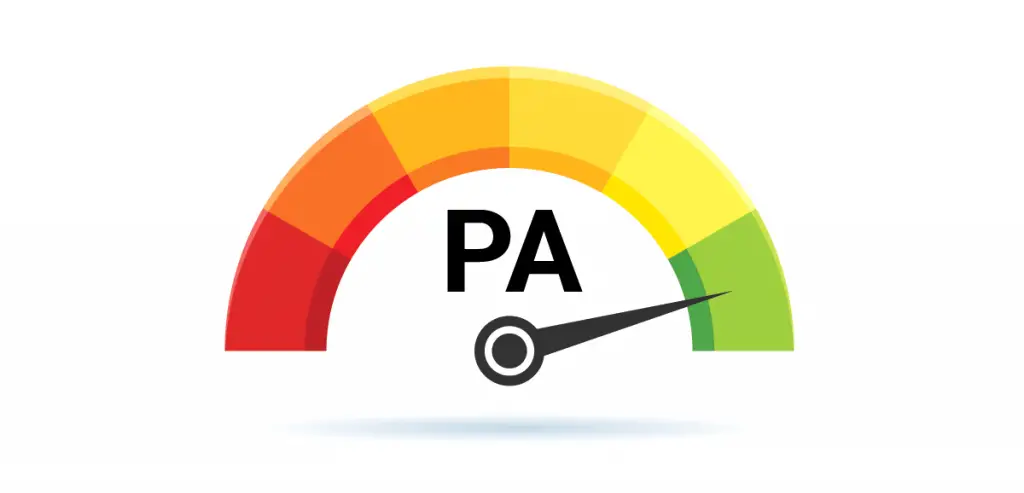In this article, we’ll answer the question, “what is Page Authority?”
Which is also known as PA in SEO (search engine optimization).
But we’ll go beyond just the definition of what does Page Authority mean. You’ll also understand what is a good Page Authority to achieve for your website as well as the various metrics that affect the PA score.
Finally, you’ll get a list of tips on how to improve your website’s PA metrics so you increase your web page ratings to get higher rankings in search engines like Google, Yahoo, and Bing.

What Is Page Authority?
Page Authority is a search engine ranking score that estimates how well a web page will rank in the search engine results pages (SERPs). Page Authority (or PA) was developed by Moz and scores range from 1 to 100, with higher PA scores indicating a better possibility of ranking.
What Is a Good Page Authority?
A good Page Authority is a score between 60 to 80 on the PA scale. Good Page Authority corresponds to a web page being able to compete in the SERPs for moderately competitive keywords. PA measures more than 40 ranking factors and is based on a 100-point logarithmic scale.
Is PA Important for SEO?
Page Authority is important for SEO because it closely represents the ranking capability of a web page in the SERPs. The higher the PA score, the more the web page is considered to be powerful and credible to Google for ranking purposes.
However, according to Moz, because of the way Page Authority is calculated, it’s best to use the PA score as a comparative SEO metric rather than an absolute score when trying to determine which web page may have better ranking ability in the SERPs.
It’s also important to understand that Page Authority doesn’t take into account on-page SEO elements like keyword usage or content optimization. PA is only measured by off-page SEO factors like the number and quality of incoming links.
Due to PA’s comparative nature, and the fact that the score will fluctuate as data being fed into the algorithm changes, Moz says that PA doesn’t necessarily have a good or bad score when you’re comparing a set of pages against each other for SEO rankings. For example, a web page with a low PA score page may outrank a URL with a higher PA score. Therefore, it’s best to use Page Authority as a relative metric alongside other important elements like Domain Authority and the quality of on-page SEO optimization.
What Affects Page Authority?
Page Authority is calculated in the same way as Domain Authority but at the individual page level. Data for this calculation comes from the Mozscape web index which includes more than 40 off-site SEO ranking factors.
Linking URLs
The total number of linking URLs will directly impact the Page Authority score.
Linking Root Domains
Linking root domains refers to the number of unique domains (or websites) linking out to your web page. For example, if you get three linking URLs from the same website under the same domain, they will count as one single root domain. Page Authority is impacted by the total number of linking root domains.
Linking Subdomains
A subdomain is an additional part of your website URL that comes before the domain name and extension. Google considers subdomains as individual entities. Therefore, the Page Authority score is also affected by the number of subdomains linking to a specific URL on your website.
Linking Pages
The quality of the external pages that send incoming links to your web page is also factored into the PA score. Linking pages that have high Page Authority of their own will help improve the target URLs PA score.
Dofollow Links
Dofollow links transfer the most PageRank authority from the originating website to the target site through the passing of link equity. The more dofollow links your web page acquires, the higher your Page Authority scores will be.
Nofollow Links
Nofollow links are backlinks that have been tagged in HTML with the nofollow attribute, and therefore, don’t officially count as an editorial vote. In the past, every nofollow link did not pass any PageRank value for SEO; however, Google’s algorithm has evolved to use the nofollow tag as a hint and not a directive. Therefore, some nofollow links will pass link equity to the target web page if Google determines it should pass the PageRank value.
301s and 302s
A 301 redirect signals that a web page has moved permanently to a brand-new location, whereas a 302 redirect means that the shift is temporary. The quantity and quality of these redirects also impact Page Authority metrics.
New vs Old Links
The number of new vs old links coming into a web page impact the Page Authority score. A URL that’s getting a steady flow of new links indicates that it is a higher quality page that is still relevant to searchers, whereas a web page that only has older backlinks may mean the page isn’t worth showing to users on Google anymore.
TLDs
Top-Level Domains or TLDs are at the top of the Domain Name System hierarchy. TLDs can be country or industry-specific and includes domain extensions like .com, .edu, .gov, .org, .uk, .ca, etc. The variety of TLDs are taken into consideration by the Page Authority algorithm.
Domain Names
Next to top-level domain extensions is the actual domain name for the website. This is the part of the URL that appears before the .com or .org, for example. The domain name for linking root domains is somehow factored into the PA score for a target web page.
Branded Domain Mentions
The number of branded domain mentions without hyperlinks is a PA scoring metric. If Moz’s algorithm detects a high number of branded domain mentions in product reviews, blog posts, and articles, then your website’s Page Authority metric can increase in value.
Spam Score
Moz has a comparative metric for measuring spam-related qualities for websites. A score of 61-100% is considered a high Spam Score and can impact your Page Authority scores throughout the site. Spam Scores are used to estimate the likelihood of your website being penalized by Google for spammy SEO practices.
MozRank
MozRank is a widely used KPI that measures the backlink popularity of a website. It uses a similar methodology as Google PageRank and is scored from 0 to 10. Scores 7 and above indicate higher authority, which can help increase the Page Authority metrics for your web pages.
MozTrust
MozTrust serves as a link trust score rather than a link popularity metric. If you achieve backlinks from other high authority web pages, then your MozTrust score will increase, and so will the PA score.
How to Increase Page Authority?
Increase the Domain Authority
PA is positively correlated with Domain Authority (DA). Therefore, you should work to increase the DA score of your website by acquiring high-quality backlinks from other reputable and trusted websites.
Get More Linking Root Domains
The more linking root domains you have a specific URL on your website, the more important it looks to the search engine algorithms. A web page that receives a lot of incoming links from a variety of domains indicates that the URL has wide link popularity. With all other things being equal, it’s better to have 10 backlinks from 10 different linking root domains than it is to have 10 backlinks from a single domain.
Increase the Number of High Authority Links
Your website’s Page Authority scores depend largely on the number of high-authority backlinks each URL receives. Therefore, to increase the Page Authority score, you want to increase the number of quality pages linking to your content.
Get More Dofollow Links
Dofollow links carry the most SEO value for PageRank. So the more dofollow backlinks you can acquire, the higher the Page Authority score will be for the target page.
Get Fewer Spammy Links
Getting backlinks from spammy, suspicious sources can increase your Spam Score and lower your Page Authority metrics. Toxic backlinks like this can also get your website penalized by Google. Therefore, you should actively monitor your website’s Spam Score and use Google’s Disavow Tool to remove spammy links from your website’s backlink profile. See this other guide on how to remove bad backlinks for step-by-step instructions on this process.

Page Authority (PA) In SEO Summary
I hope you enjoyed this guide answering the question about what is Page Authority.
As you discovered, Page Authority means a score between 1 to 100 and it often correlates with how well a web page will rank in the search engine results pages compared to a competitor’s URL. Therefore, focusing on PA in SEO is important for improving the search engine visibility for the content that matters most for your business to get more organic traffic from Google, Yahoo, and Bing.

SEO Chatter is dedicated to teaching the fundamentals of search engine marketing to help marketers understand how to increase organic website traffic and improve search engine rankings.
